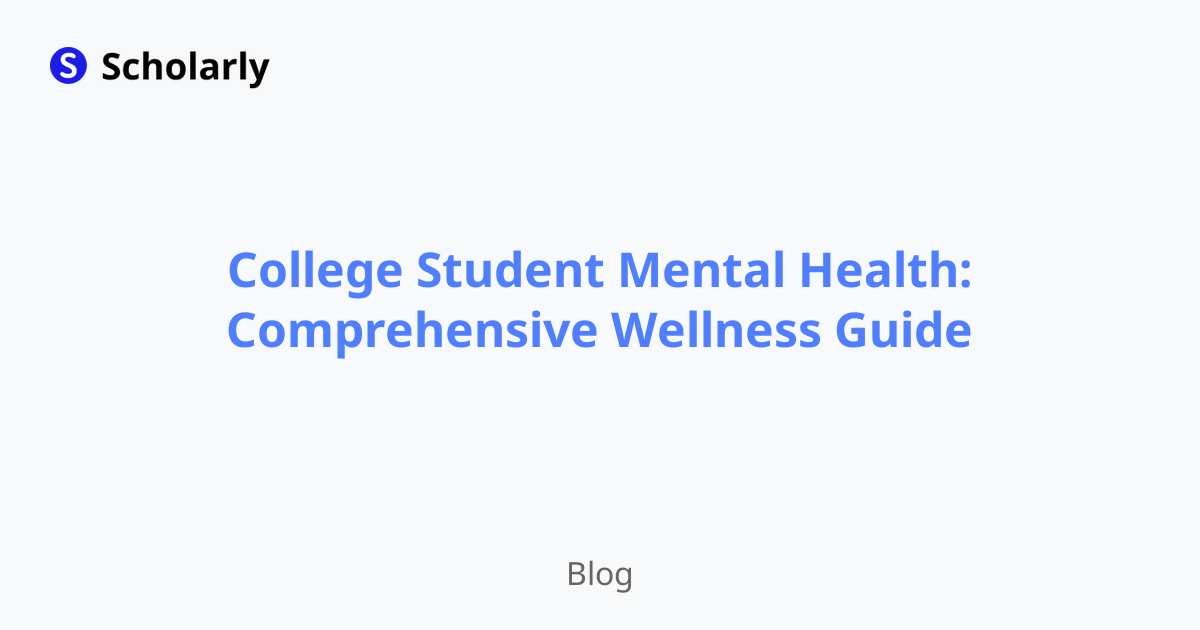College Student Mental Health: Comprehensive Wellness Guide
Prioritize your mental health with evidence-based strategies for managing stress, anxiety, depression, and other common college mental health challenges.

Introduction
Mental health challenges affect 60% of college students, with anxiety and depression being the most common concerns. The transition to college, academic pressures, social changes, and future uncertainties create a perfect storm for mental health struggles. However, with proper knowledge, resources, and strategies, students can maintain good mental health while thriving academically and socially.
Methods
1. Understanding College Mental Health
Common Challenges:
- Adjustment disorders related to college transitions
- Academic anxiety and performance pressure
- Social anxiety and relationship difficulties
- Depression and mood disorders
- Substance use and addiction issues
- Eating disorders and body image concerns
Risk Factors:
- Previous mental health history
- Family history of mental illness
- High academic pressure and perfectionism
- Social isolation and loneliness
- Financial stress and uncertainty
- Major life changes and transitions
2. Prevention and Early Intervention
Building Resilience:
- Develop healthy coping mechanisms for stress
- Build strong social support networks
- Maintain regular sleep and exercise routines
- Practice mindfulness and stress management
- Set realistic goals and expectations
- Learn to recognize early warning signs
Stress Management Techniques:
- Deep breathing and progressive muscle relaxation
- Regular physical exercise and movement
- Mindfulness meditation and yoga
- Time management and organization skills
- Creative outlets and hobbies
- Social connection and support seeking
3. Professional Help and Resources
Campus Mental Health Services:
- Counseling and psychological services
- Crisis intervention and emergency support
- Group therapy and support groups
- Psychiatric services and medication management
- Wellness programming and workshops
When to Seek Help:
- Persistent sadness or hopelessness
- Overwhelming anxiety or worry
- Difficulty sleeping or changes in appetite
- Thoughts of self-harm or suicide
- Substance use affecting daily functioning
- Academic performance significantly declining
4. Self-Care and Wellness Strategies
Daily Wellness Practices:
- Maintain consistent sleep schedule
- Eat nutritious meals regularly
- Stay physically active
- Practice gratitude and positive thinking
- Limit social media and screen time
- Engage in meaningful activities and relationships
Crisis Management:
- Develop personal crisis plans
- Identify warning signs and triggers
- Know emergency contacts and resources
- Practice grounding techniques
- Have safety plans for difficult moments
- Use crisis hotlines when needed
Benefits
- Improved Academic Performance: Good mental health enhances focus and learning
- Better Relationships: Emotional wellness improves social connections
- Increased Resilience: Mental health skills help navigate life challenges
- Long-term Wellbeing: College mental health habits establish lifelong patterns
Challenges
- Stigma: Mental health stigma can prevent help-seeking
- Resource Access: Limited campus resources or long wait times
- Recognition: Difficulty identifying when normal stress becomes problematic
- Time Management: Balancing self-care with academic demands
Conclusion
Mental health is as important as physical health for college success and life satisfaction. Prioritize self-care, build support networks, and don't hesitate to seek professional help when needed. Remember that struggling with mental health doesn't reflect weakness—it reflects the very real challenges of college life and the importance of taking care of yourself.
Try Our Popular AI Study Tools
Transform your study materials into interactive learning experiences with our most popular AI-powered tools:
PDF to Flashcards
Convert lecture notes and textbooks into study flashcards instantly
Text to Flashcards
Turn any text or notes into comprehensive flashcard sets
Image to Flashcards
Convert diagrams and handwritten notes into digital flashcards
YouTube to Flashcards
Generate flashcards from educational video content



